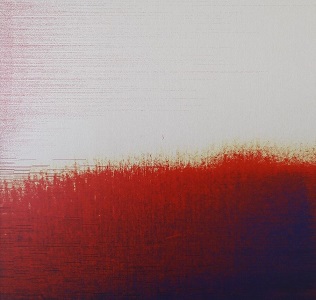 In Versatile Ambience’s second half, Jeph Jerman and Tim Barnes cobble together a sequence of individual words and short phrases from a small ensemble of speakers. As each solitary fragment, captured with varying degrees of fidelity, falls into place, a kind of instructional sense emerges from the cut-up poetic randomness: "Your voice arrested; the smithy’s forge displacing hard footfall with scrutiny of boot-leather. Attempts to redirect equally malleable." A final exchange points the way to Versatile’s heart: "You, the anvil?" someone questions. A faded voice replies, "I’m the hammer." Using insect and animal life, tape noise, and acoustic performances from Jacob Duncan and Ken Vandermark, Jerman and Barnes temper their field recordings like a smith tempers metal, constantly moving from ambiguity to particularity and back again, molding their music with heat and cold. Seemingly inconsequential sounds, like the dry splash of fallen leaves, become intricate explosions. The wooden hum of a violin unfurls and sinks like a wave at sea and the album sways between modes, constantly eluding the firm grip of a total view.
In Versatile Ambience’s second half, Jeph Jerman and Tim Barnes cobble together a sequence of individual words and short phrases from a small ensemble of speakers. As each solitary fragment, captured with varying degrees of fidelity, falls into place, a kind of instructional sense emerges from the cut-up poetic randomness: "Your voice arrested; the smithy’s forge displacing hard footfall with scrutiny of boot-leather. Attempts to redirect equally malleable." A final exchange points the way to Versatile’s heart: "You, the anvil?" someone questions. A faded voice replies, "I’m the hammer." Using insect and animal life, tape noise, and acoustic performances from Jacob Duncan and Ken Vandermark, Jerman and Barnes temper their field recordings like a smith tempers metal, constantly moving from ambiguity to particularity and back again, molding their music with heat and cold. Seemingly inconsequential sounds, like the dry splash of fallen leaves, become intricate explosions. The wooden hum of a violin unfurls and sinks like a wave at sea and the album sways between modes, constantly eluding the firm grip of a total view.
Despite the microscopic perspective Jeph and Tim can sometimes proffer with their microphones, both sides of Versatile Ambience feel wide open and lived-in, more like a three-dimensional photograph than an enlarged frame. Birds and airplanes are audible not in isolation, but against an enormous evening sky. Crickets chirp across broad grassy fields and voices resound inside concrete rooms or on distorted tapes. Nearly every sound is shadowed by context, either in the guise of environmental detail or spatial complexity. When grating metal or the drone of a saxophone enters the mix, they inhabit the same spaces as every other sound. They come from inside rooms or from behind walls and they’re lit by the same lights, bordered by the same landmarks. Subway cars and frazzled electronic signals spill out of shared tunnels, instruments tremble in the wind like tall grass, and bits of debris multiply until they become environments of their own, inscrutable as individual elements.
With so much going on, it’s surprising how sparse and restrained the album can be, both filled with sound and somehow also empty. In the first eight to ten minutes, small, toy-like beeps, contact microphones, and the pulse of insect chatter are introduced in slow succession, revealed as if a cloth were being lifted from them. Besides these, just a few other mundane reports spark in the dusk, littering the scene with domestic turbulence. Eventually, clarinet, horns, guitar, and other instruments hover into view, stretched out like muted colors on the horizon.
Presented alone, their timbres are emphasized and the wavering qualities of their voices prevail. In groups, texture jumps to the fore. They’re simultaneously atmospheric and harmonic, and when paired with cracking timber or the current of a power line they sound less like instruments and more like one part in a larger organic sequence. A butterfly flaps its wings in Kentucky and somewhere in Illinois a musician blows into their bass clarinet.
Hearing such a relationship is both a matter of hearing those things (or something like them) in proximity and of being open to the shared domain proposed by this kind of music-making. It’s reasonable to guess that one listener will hear a web of sounds and the other a collection of disjointed phenomena, but the care Jeph Jerman and Tim Barnes have taken in arranging their work, the way they invite attention to detail and participation by keeping their mix transparent, indicates a love for and connection to their chosen materials. By bringing human voices (and instruments) to the table and reciting aleatory poetry, they place human activity, one that may or may not carry sense, within the sphere of the non-human world. The large cuts into the small, subconscious energy underscores conscious awareness, and sonic refuse always trails in the wake of controlled circumstances.
As side two ends in a fireball of strained electronics, it’s easy to imagine someone being overwhelmed by the intricacy of an apparently simple scene. Events that once appeared to unravel in confinement suddenly reach out in a hundred directions. The ability to think of an event shrivels as the recognition of an impossibly complex nexus expands.
samples:
 
Read More

